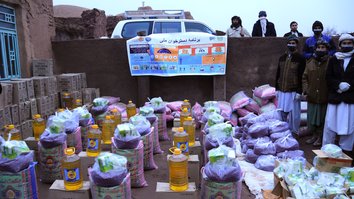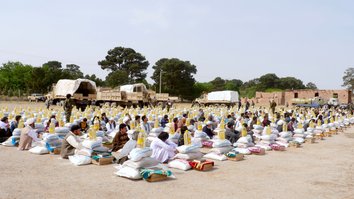HERAT -- The Taliban have been preventing the implementation of Dastarkhwan-e-Meli -- a 22.2 billion AFN ($288 million) aid initiative -- in some districts of Ghor province, local authorities said.
More than four million families in 34 provinces benefit from the initiative, which the Afghan government launched in July as part of its novel coronavirus (COVID-19) relief efforts.
Packages distributed by Dastarkhwan-e-Meli, each worth 4,000 AFN ($52), provide families with flour, rice, beans, oil and soap.
But in Tulak and Shahrak, this aid has been distributed only in the district centres, as the Taliban have blocked distribution to the villages, said Hamidullah Azimi, the official in charge of the programme in Ghor.
![As part of the Dastarkhwan-e-Meli programme, workers distribute food to needy families February 5 in Lal Sar Jangal district, Ghor province. [Najibullah Nazari]](/cnmi_st/images/2021/03/29/29128-g_2-585_329.jpg)
As part of the Dastarkhwan-e-Meli programme, workers distribute food to needy families February 5 in Lal Sar Jangal district, Ghor province. [Najibullah Nazari]
"The assistance from the Dastarkhwan-e-Meli programme is very useful in these circumstances as civilians are facing extreme poverty and hunger," said Ghor provincial council member Mohammad Mehdawi.
But "people are suffering" from the Taliban policy, he said, calling on the Taliban not to prevent the distribution of humanitarian assistance.
"This food assistance can save many lives," Mehdawi said. "The Taliban should not politicise and militarise such assistance and [prevent it from reaching] the poor and needy."
If the Taliban continue stopping the distribution of assistance, civilians will face acute hunger, he added.
'Unacceptable' stoppage of aid
The Taliban's refusal to permit aid under the Dastarkhwan-e-Meli initiative demonstrates the group's enmity to the Afghan people, said Ghor province resident Sultan Mohammad Alizada.
Seventy percent of the country's population lives in poverty, he noted.
"The Taliban should not prevent the distribution of assistance to these people," he said, calling on the group to show consideration for the thousands of poor and needy families who direly need assistance.
The Taliban's thwarting of Dastarkhwan-e-Meli assistance is unacceptable, said Ghor resident Mohammad Gul Poya.
"Our people are poor and needy, living in poverty with no jobs," he said. "The Taliban should not further pressure the public. The Taliban have no right to prevent public projects that benefit the general population."
Government assistance and the implementation of development projects are very effective in creating jobs and reducing poverty and can change the lives of the rural poor, he said.
In addition to blocking the distribution of government assistance, the Taliban extort money from civilians under the pretext that they are collecting ushr and zakat, said Ghor provincial council member Hamidullah Mutahid.
"Residents of areas under Taliban control live in fear of violence and torture," he said. "The Taliban force them to pay them money under different pretexts. Those who cannot afford to pay the Taliban are brutally tortured."
Extortion of public funds
The Taliban co-opt 30% of the budget meant for development projects in areas under their control, say local authorities in Ghor
They take part of these funds by force and prevent the implementation of the projects if they do not get their cut, said Zalmai Karimi, a spokesman for the Ghor governor.
"Projects that the government implements in villages include the construction of schools, hospitals, roads and bridges," he said. "But the Taliban extort money from all these projects and will not allow construction companies to start work unless they are paid off."
Over the past year, he said, the Taliban have blown up a number of roads and bridges across Ghor province because they did not receive payments they demanded.
Parts of the Ghor-Herat highway were destroyed, as was a large bridge in the Kamanj area and a 10km-long stretch of road in Firoz Koh.
A number of development and infrastructure projects that would create jobs and improve lives are not being implemented as a direct consequence of the Taliban's threats, said Ghor province activist Hasan Hakimi.
The Taliban allow development projects in villages to go ahead only if a large portion of the project budget goes to them, he said.
"Because of Taliban extortion of development projects in villages, fewer construction companies are willing to implement these projects," he said. "The quality of these projects is very low because of Taliban extortion."








Taliban should not prevent food items that the government intended to distribute to the poor families, because the people of Ghor have faced drought and other problems in the recent years, and these food items are very vital to the poor people. These items can provide them with food for at least one or two months.
Reply2 Comment
May God have mercy on our people. The International Organizations collect charity funds from the foreign countries and bring it to Afghanistan. In Afghanistan, half of these funds are looted by thieves and looters of the former Northern Alliance under the name of mujahideen. A good example of them is Ahmad Zia Masoud who took away $52 million from Afghanistan and was caught on Dubai airport. Others are thieves and looters like Atta Mohammad Noor, Zahir Qadeer, Gul Agha Sherzai, General Bismillah Khan the dung seller, the illiterate Marshal Fahim… who looted half of the country. The remaining part is divided in half by the corrupt circles inside the government. Then half of that is taken by other thieves and looters under the name of foreign and internal organizations which say that they are implementing the projects. When half of the remaining amount reaches to the residents, again half of it is taken by Taliban, and this way, almost 1/16 of it is reaching to the people. The biggest way of solution is that the international community fund building irrigation and hydropower dams similar to that of Kamal Khan dam on the Kunar, Kabul, Laghman, Helmand, Harirud rivers… and these should be be completed immediately in a period of 5 years. Our people like farming, the arable lands' farmers will earn money for their families through farming, and when the electricity is produced, the factories' workers will earn money from their works in the factories and will produce items.
Reply2 Comment